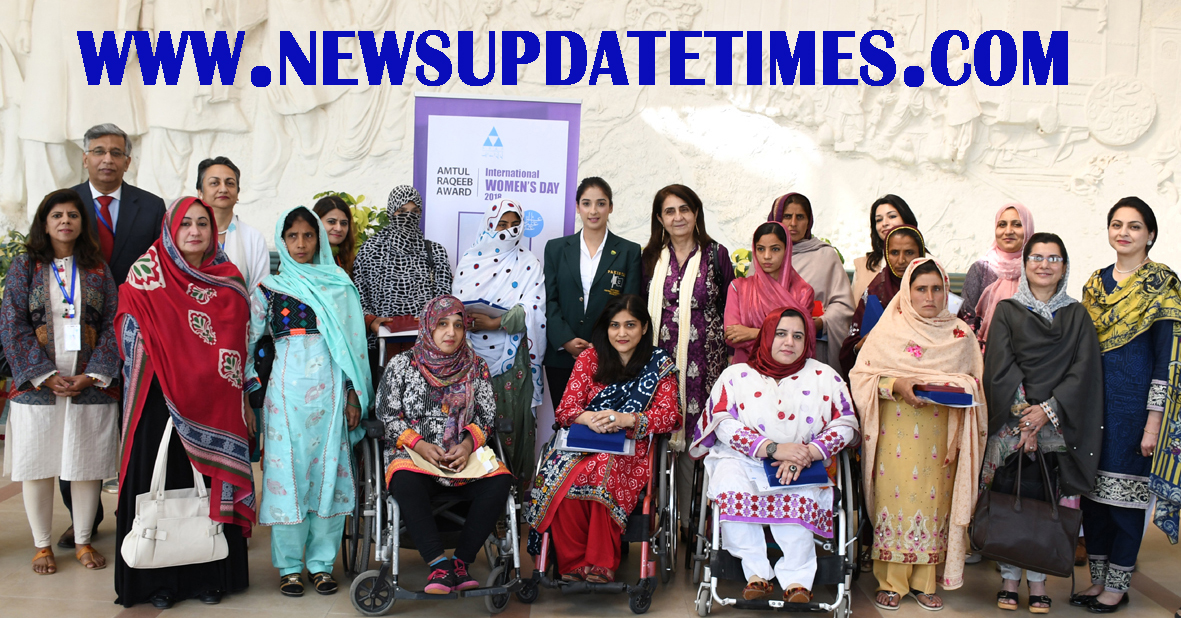Lahore – Pakistan Poverty Alleviation Fund organized “7th PPAF Amtul Raqeeb Awards” to acknowledge the exceptional contribution of women in PPAF-supported community institutions across Pakistan in order to mark International Women’s Day 2018. This year the award highlighted the work of seven women champions including Nazia Bibi (Dera Bugti, Balochistan), Rubeena Bibi (Nowshera, KP), Rabbihat Jameel (Bajuar Agency) Saima Bibi (Thatta, Sindh), Kiran Irshad (Rajanpur, Punjab), Naheed Akhtar (Azad Kashmir) and Naureen Akhtar (D.I. Khan, KP) for making themselves heard and bringing positive transformation not only to their lives but also to the lives of communities they come from. While receiving the awards the awardees shared their stories and appreciated PPAF and its partner organizations for the enormous support in transforming their lives and making them believe in their strengths.
All these women belonging to far flung areas of the country were accredited for their courage in the face of adversity and for becoming role models in their respective communities. The selection criteria for this year’s event brought into focus women belonging to the under-privileged districts of Pakistan where PPAF is supporting projects under the Government of Pakistan’s Prime Minister’s Interest-Free Loan Scheme, Programme for Poverty Reduction funded by the Government of Italy, the Livelihood Support and Promotion of Small Community Infrastructure Programme (LACIP) and Hydropower and Renewable Energy Programme funded by the KfW.
Following its core value of inclusion, this year PPAF presented awards to Maria Qureshi from Sialkot and Afshan Afridi from Peshawar to honor their outstanding contribution to support women with disabilities. Both these women are physically disabled but are facing challenges of life with grit and courage. They are taking initiatives aimed at raising awareness on rights of people with disabilities so that this mostly ignored cadre of the society feels accepted and can educate themselves, learn skills and build their capacities for a playing a productive role in the society.
Ms. Asmara Kiani, member of the National Women Football Team and Head coach for the Total Football Youth Academy was the chief guest at the occasion. Ms. Kiani commented, “Women are truly capable of achieving anything they set their sight on but it is necessary for them to have opportunities. Organizations like PPAF are trying to fill this gap and I applaud their initiative of recognizing and encouraging these fantastic women and I hope to see many more stories of success in the future.”
Ms. Roshan Khursheed Bharucha, Chairperson PPAF, stated, “PPAF is proud to be an enabler for these women. Their passion to make a difference is truly remarkable. It’s amazing to hear stories of women who overcome a host of challenges and manage to not only improve their lives but also bring positive change to the lives of others. These women are the real life heroes of our society and deserve all the recognition they can get.” She also appreciated the exclusive work of PPAF and winning the Global Diversity and Inclusion Award 2018 for achieving mission through its innovative approach to empower the marginalized in distant areas of the country.. MS. Simi Kamal, Senior Group Head , Grants Operations PPAF affirmed, “PPAF firmly believes in the power of investing in women. It is indeed an honor to acknowledge the work of these women who will be receiving the Amtul Raqeeb awards today. These powerful women and their stories are truly inspiring for all of us.”
PPAF’s Gender Committee was formed in 2012 under the leadership of Mr. Qazi Azmat Isa, CEO PPAF, to take forward change within the organization and its work. , “ As he rightly says, “Uplifting women has a ripple effect as an empowered woman will take all her knowledge, resources and freedom and use it to transform lives around her. If girls and women are given equal chances of growth and development as boys and men then that in itself would bring a big change in our communities and in the country.”
PPAF organizes “Amtul Raqeeb Awards” on International Women’s Day in the memory of PPAF social mobilizer (Amtul Raqeeb) who was killed by terrorists in 2011 on her way back from healthcare center in Mastung, Balochistan. The award pays tribute to the courageous Amtul Raqeeb and encourages women change makers in rural settings for their sustained efforts toward societal development. Amtul Raqeeb’s immense contribution in capacity building of local traditional birth attendant resulted in a significant reduction of mother child mortality rate in the inaccessible region of Pakistan.
Each year the nominees are selected on the basis of their contributions as women entrepreneurs, social activists and innovative champions for bringing positive change at the household and community level. PPAF held the first Amtul Raqeeb Award ceremony in 2012. So far, 40 women and two men have been conferred with Amtul Raqeeb award during the last six years.
PPAF encouraged its local partner organizations to share moving stories of women belonging to the most deprived regions of Pakistan who are performing extraordinary feats in areas including primary healthcare, girls’ education, livelihood and entrepreneurship, water, energy, infrastructure, climate change, environment and disaster preparedness.
The Pakistan Poverty Alleviation Fund (PPAF) is the lead apex institution for community-driven development in Pakistan. PPAF works as private sector organization in support of public policy by providing an array of financial and non-financial services to the poorest and the most marginalized rural households and communities across Pakistan. PPAF’s investment in developing capacities of its partner organisations and community institutions has resulted in addressing poverty in vulnerable and remote areas and providing opportunities for sustainable livelihoods.
PPAF approach is to develop representative, inclusive, transparent and accountable institutions of the poor. The catalytic role of women in programme design, delivery and impact is at the core of all interventions. Access and opportunities for women are enabled through financial assistance in the form of interest-free, loans, and asset transfer & livelihood development.






